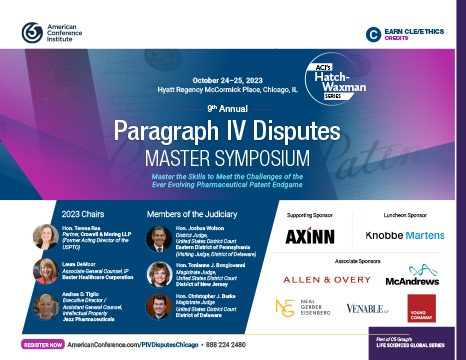Agenda

View the 2023 Brochure
Flip through our 2023 conference brochure and discover what’s new this year.
- Jump to:
- At a Glance
- Day 1
- Day 2
- Print-friendly Format
Day 1 - Tuesday, October 24, 2023
Day 2 - Wednesday, October 25, 2023
| 8:00 |
Opening Remarks |
| 8:15 |
Brand and Generic Insights on FDA Programs Impacting Pharmaceutical Patents: Regulatory Initiatives and Recent FDA Litigation Every PIV Practitioner Needs to Know About |
| 9:15 |
Best Practices for Utilizing FDA’s Citizen Petition Process: Brand and Generic Recommendations for Achieving Market Access and Petitions for Reconsideration |
| 10:15 |
Networking Coffee Break |
| 10:30 |
FTC KEYNOTEAntitrust Developments Concerning Brands & Generics |
| 11:15 |
A 360 Degree Examination of Reverse-Payment Settlements: Non-Monetary Provisions, State Legislation, Expert Testimony, and Recent Litigation |
| 12:15 |
Networking Luncheon |
| 1:30 |
THE PTAB LIVE!The APJs Speak on Practices, Policy and Procedure |
| 2:30 |
A Comprehensive Handbook for Pharmaceutical Patent Litigation Funding and Alternative Fee Arrangements |
| 3:45 |
Afternoon Break |
| 4:00 |
ETHICS CASE STUDIESCybersecurity, Information Security, and the Ethical Protection of Data |
| 5:00 |
Conference Concludes |
Day 1 - Tuesday, October 24, 2023
| 8:00 |
Opening Remarks from the Co-Chairs Laura DeMoor  Andrea D. Tiglio, PhD, JD |
| 8:15 |
Patents, Drug Pricing, and Price Controls: Understanding How the Inflation Reduction Act (IRA) Will Impact The Value of Pharmaceutical IP John T. Bennett  Anita Spieth
|
| 9:15 |
Chief IP Counsel RoundtableDay-to-Day Concerns and Forward-Looking Strategic Planning Neema Kumar  James P. Leeds  Lars P. Taavola Moderator: William A. Rakoczy Pharmaceutical Chief IP Counsel sit at the helm of the Hatch-Waxman litigation nerve center where they navigate the ever-evolving landscape of pharmaceutical patent litigation. With the intent of IP protection preservation or defeat at the forefront of their agendas, these panelists will discuss best practices and strategies they employ to control or covet patents and profits. Brand Perspectives
Generic Perspectives
Considerations for Both Sides
|
| 10:15 |
Networking Coffee Break |
| 10:30 |
Insights on the Future of §112: Satisfying the Requirements of Enablement and Written Description under Amgen v. Sanofi Mary C. Till  Jason Murata  Emily Larrimer Savas  Emer Simic
|
| 11:45 |
The Pain of Rejection: A Deep Dive into the Business and Legal Implications of the Supreme Court’s Denial of Cert. in Recent Patent Eligibility and Carve-Out Cases Jay R. Deshmukh  Steven J. Horowitz  Alejandro Menchaca  James T. Peterka  Irena Royzman Last Spring, despite the push from the U.S. Solicitor General, the Supreme Court declined to hear three key patent cases, two cases involving §101, Tropp v. Travel Sentry et al. and Interactive Wearables v. Polar Electro Oy, et al., and the infamous GSK v. Teva. During this session, our panelists will analyze the significance of the Supreme Court’s refusal to hear these cases and explore the potential impact on Hatch-Waxman litigation strategies. They will also market dynamics, and the overall impact of these rejections on the pharmaceutical IP landscape. Points of discussion will include:
|
| 1:00 |
Networking Luncheon
|
| 2:00 |
What Every U.S. Pharmaceutical Patent Litigator Needs to Know About the Unitary Patent (UP) and the Unified Patent Court (UPC) Liz Cohen  Sarah Fendrick, Ph.D., J.D.  Ha Kung Wong  Ruud van der Velden The introduction of the UP and the establishment of the UPC have far-reaching implications for pharmaceutical patents issued in the U.S. that cannot be ignored. Without an understanding of the UP and the UPC, pharmaceutical patent holders in the U.S. may not be able to globally protect innovations. This undoubtedly would hinder cost savings, as well as compromised streamlined portfolio management and limit alternative enforcement options. During this session, our global thought-leaders will delve into the intricacies of the UP and the UPC, and explore their significant impact on the global patent ecosystem. Topics of discussion will include:
|
| 3:00 |
Patent Reissue and Reexamination in the Hatch-Waxman Realm: Strategies for When to Pursue and Correct Patent Errors Vikram A. Mathrani  Joseph Reisman  Gregory A. Morris In this session, our panelists will navigate the legal nuances and practical implications of patent reissue and reexamination in Hatch-Waxman litigation. Topics of discussion will include:
|
| 4:00 |
Afternoon Refreshment Break |
| 4:15 |
MAGISTRATE TOWN HALLUnderstanding the Roles of the Magistrate Judges and Local Counsel in Paragraph IV Proceedings Hon. Tonianne J. Bongiovanni  Hon. Christopher J. Burke Moderator: Adam W. Poff In the complex landscape of pharmaceutical patent disputes, these esteemed magistrate judges play a pivotal role in ensuring fair and efficient resolution of cases. With their unique perspective, Magistrate Judges bring a wealth of knowledge to the bench, navigating the intricate interplay between pharmaceutical innovation and intellectual property rights. During this session, Magistrate Judges from the most active jurisdictions will share their invaluable insights and experiences, shedding light on the critical decisions they make and the profound impact they have on shaping the future of pharmaceutical patent litigation. |
| 5:15 |
VIEW FROM THE FEDERAL BENCHDistrict Court Judges on the Present State of Paragraph IV Litigation: Filing Trends, Settlements and Timings Hon. Joshua Wolson Interviewed By: Arlene Chow District Court Judges are at the forefront of shaping the landscape of pharmaceutical IP law. During this can’t-miss roundtable, distinguished District Court Judges will share their unique perspectives, illuminating the delicate balance between patent holders, generic drug manufacturers, and public interest. |
| 6:15 |
Conference Adjourns to Day Two |
Day 2 - Wednesday, October 25, 2023
| 8:00 |
Opening Remarks Laura DeMoor  Andrea D. Tiglio, PhD, JD |
| 8:15 |
Brand and Generic Insights on FDA Programs Impacting Pharmaceutical Patents: Regulatory Initiatives and Recent FDA Litigation Every PIV Practitioner Needs to Know About Maryll W. Toufanian  Maarika L Kimbrell For Hatch-Waxman litigators, staying up to date with new FDA regulations is crucial. By monitoring these developments, Hatch-Waxman litigators can adapt their strategies, assess the potential impact on patent validity and infringement disputes, and navigate the evolving landscape of pharmaceutical patent litigation effectively. During this session, our panelists will help you understand the nuances of new regulations and initiatives, empowering you to provide valuable insights, and advocate for your clients’ interests. Topics of discussion will include:
|
| 9:15 |
Best Practices for Utilizing FDA’s Citizen Petition Process: Brand and Generic Recommendations for Achieving Market Access and Petitions for Reconsideration Ryan Kaat  Sara W. Koblitz In this session, panelists will demystify the 505(q) Citizens Petition process, equipping Hatch-Waxman litigators with the knowledge and tools to effectively utilize this valuable regulatory tool. Topics of discussion will include:
|
| 10:15 |
Networking Coffee Break |
| 10:30 |
FTC KEYNOTEAntitrust Developments Concerning Brands & Generics Rebecca Egeland |
| 11:15 |
A 360 Degree Examination of Reverse-Payment Settlements: Non-Monetary Provisions, State Legislation, Expert Testimony, and Recent Litigation Richard Kurz  Eric Grannon  Tasha Francis Gerasmiow  Ted Mathias
|
| 12:15 |
Networking Luncheon |
| 1:30 |
THE PTAB LIVE!The APJs Speak on Practices, Policy and Procedure Honorable Grace Obermann  Honorable Linda Horner Moderator: William Zimmerman
|
| 2:30 |
A Comprehensive Handbook for Pharmaceutical Patent Litigation Funding and Alternative Fee Arrangements Ryan M. Daniel  Kevin Nelson  Justin A. Maleson Litigation funding can help businesses pay for legal fees and expenses, including increasingly costly expert fees. Alternative fee arrangements can provide risk averse litigants with the confidence to see cases through to their conclusion, even against the best-capitalized defendants. In this interactive practical session, topics of discussion will include:
|
| 3:45 |
Afternoon Break |
| 4:00 |
ETHICS CASE STUDIESCybersecurity, Information Security, and the Ethical Protection of Data Tom Irving  Kevin E. Noonan  Shashank Upadhye Attorneys oversee myriad of sensitive information daily, and confidentiality is a core tenet of the legal profession. Now, more than ever before, cybersecurity must be an ever-present priority for Hatch-Waxman practitioners. This session will offer best practices for protecting your clients’ information, identify the main risks specific to the life sciences and intellectual property, and provide proven strategies on optimizing your firm’s cybersecurity approach that you can immediately implement. |
| 5:00 |
Conference Concludes |
